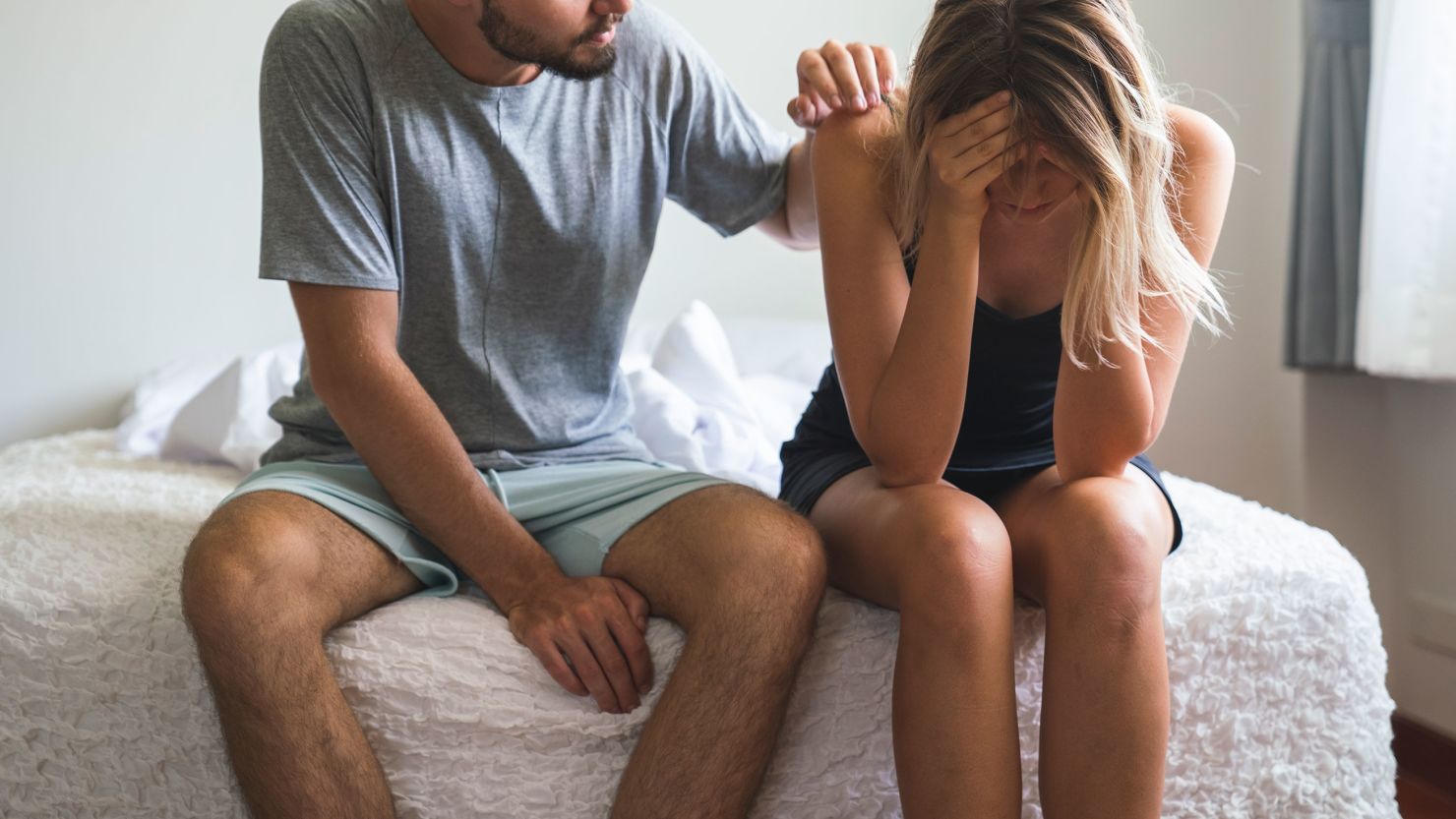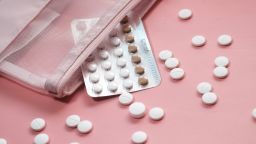Get inspired by a weekly roundup on living well, made simple. Sign up for CNN’s Life, But Better newsletter for information and tools designed to improve your well-being.
You’ve started taking an antidepressant, and it’s helping you to finally feel like life is worth living or that you can stop avoiding your friends’ texts. All seems right in the world — until the moment you realize your sex life has taken a hit.
More than one in 10 people in the United States take antidepressants, and at least 8.6 million people in England take them. And since the Covid-19 pandemic, the number of people on antidepressants has surged. (Data on the number of people taking antidepressants worldwide is lacking.)
“Some people actually find, when they’re treated for depression, that their sexual function improved,” said Dr. Jonathan Alpert, the Dorothy and Marty Silverman Chair of the department of psychiatry and behavioral sciences at the Albert Einstein College of Medicine in New York City. “We believe that’s because interest in sexual activity and enjoyment and pleasure are often affected by depression itself, just like other activities that give us joy and pleasure are affected by depression.”
Yet for anywhere from 40% to 60% of people on these medications, that isn’t the case, Alpert said, and the sexual side effects they experience run the gamut. Some people lose their libido or ability to become aroused, while others have problems with genital sensitivity, genital lubrication, reaching orgasm or having satisfying orgasms, or ejaculation.
Others experience more than one symptom, said Dr. Lauren Streicher, clinical professor of obstetrics and gynecology at Northwestern University’s Feinberg School of Medicine. Streicher is also the founding medical director of the Northwestern Medicine Center for Sexual Medicine and Menopause.
The difficult trade-off of feeling less depressed or anxious, yet not being able to fully enjoy a dimension of life that’s also part of mental health, can be distressing, experts said.
“The ripple effect is very, very significant,” Streicher said, sometimes causing low self-esteem, more depression or anxiety, anger or frustration.
Couples can feel guilt, shame or concern in terms of wondering whether the sexual dysfunction reflects the relationship or sexual performance, as opposed to being a side effect of the medication, Alpert said.
Here’s what you should know about why these side effects happen, and what treatments are available.
The science behind sexual dysfunction
The science behind antidepressant-induced sexual dysfunction boils down to a few things: your neurotransmitters, blood flow and muscular system, all of which are controlled by the brain — “the most important sex organ,” Streicher said.
The class of antidepressants most commonly associated with sexual dysfunction is selective serotonin reuptake inhibitors, or SSRIs, which treat depression by ultimately increasing levels of the neurotransmitter serotonin in the brain.
Serotonin is one of the key neurotransmitters involved in libido and arousal, Streicher said, which are the first two components of sexual response. While libido refers to your baseline desire to be sexual, arousal is the state of getting physically or mentally turned on by sexual stimuli.
Even though a higher level of serotonin can make someone feel better mentally, it can kill libido and mental arousal. The reason why may be similar to whatever causes the emotional blunting some people experience when SSRIs lead to not only feeling less depression-related pain but also less emotion in general, Alpert said. This paradox is something scientists are still trying to understand.
Now, what’s necessary for physical arousal and orgasm is increased blood flow to the genitalia, which makes nerve endings in these organs more sensitive, Streicher said. At some point, these factors send signals to the brain that result in the muscle contractions accompanied by orgasm, she added.
These functions can be inhibited by a higher level of serotonin not only in the brain but also in other areas of the body directly involved with sex, experts said. That inhibition in other areas of the body may be due to SSRIs potentially restricting blood flow by binding to alpha-1 adrenergic receptors, which are found in blood vessels in the skin, brain and more. The receptors control constriction and dilation in the smooth muscle fibers in the walls of these blood vessels.
“The range of physiological activities that serotonin … participates in is very wide,” Alpert said. “It’s in the brain, the spinal cord, the genitalia. It’s in nerves around blood vessels. So, we think that the effects of (serotonin-based) antidepressants are really at multiple levels.”
Since not everyone taking these medications experiences sexual dysfunction even with higher levels of serotonin in the body, there may be underlying factors — such as genetics — making some people more prone to being negatively affected, Streicher said.
What you can do
There are some treatments that might help, but “this is not a do-it-yourself project,” Streicher said. You must work with your prescribing doctor to troubleshoot the issue since the physician would prescribe medication based on needs and medical history, and because working with a professional can help you avoid any harm of tweaking your medication plan yourself.
If you’ve just started taking an antidepressant within the last few weeks, a doctor might suggest you wait to see if dysfunction resolves as your body adjusts. But this alleviation only happens for about 1 in 5 people, Alpert said.
“For some people, as early as two to three months, it’s going to get better,” Streicher said. “If six months into this, you’re still having problems — at that point it’s really unlikely that the effects are just going to go away on their own.”
That’s when a doctor may make a few tweaks in the medication plan. Sometimes lowering the SSRI dose a little helps people still do well mentally without having sexual dysfunction, Alpert said.
“Then there’s the whole concept of the ‘drug holiday,’ meaning that you go off the drug for a couple of days a week in order to boost your sexual function during that time,” Streicher said. Some people also schedule their consumption of medications far in advance of when they might have sex.
But both methods must be done carefully with a doctor to avoid withdrawals or the return of mental health symptoms, Alpert said.
A common solution is switching to bupropion, which is a norepinephrine-dopamine reuptake inhibitor, or NDRI. Bupropion is more conducive to sexual function because instead of increasing serotonin such as SSRIs do, it ups the amount of dopamine in the brain, which supports sexual desire and response, experts said. Other times, to better manage or alleviate dysfunction, doctors may add another medication to what someone is currently taking.
Sometimes this remedy is in the form of non-psychiatric medications, which can help by operating on the same mechanisms underlying the sexual side effects of antidepressants.
Medications for general sexual dysfunction, such as sildenafil or phosphodiesterase type 5 inhibitors, are sometimes prescribed to promote dilation of blood vessels — allowing better blood flow — and muscle relaxation in genital areas, counteracting the blood vessel constriction caused by high levels of serotonin, experts said. The reasoning is similar to the prescription of blood pressure medications for sexual dysfunction.
Also, researchers are currently testing a topical sildenafil in clinical trials to improve arousal and orgasm in people with clitorises, Streicher said.
Modifying a medication plan can be a trial-and-error situation with no guarantee in what will work for you or how soon, which can add to the frustration, Streicher said.
If your psychiatrist thinks so, eliminating medication entirely and managing your mental health in other ways could be another option.
Sex toys, or sex “tools,” as Streicher calls them, can also help in the context of being needed to help make the trappings of sex — such as arousal and orgasm — possible rather than to make sex simply more pleasurable.
“Any time that things are muted when neurologic endings aren’t as sensitive, then obviously increasing the amount of stimulation is going to help,” she added. It explains why vibrators can be helpful for people with clitorises, as research on orgasmic dysfunction and genital sensation deficiency among this group has found that clitoral sensitivity to vibration degrades more slowly than clitoral sensitivity to light touch, Streicher said.
The conditions that require antidepressants can be debilitating and life-threatening, so don’t let the potential for sexual side effects prevent you from exploring mental health treatments, Alpert said. “So many things can be done.”






